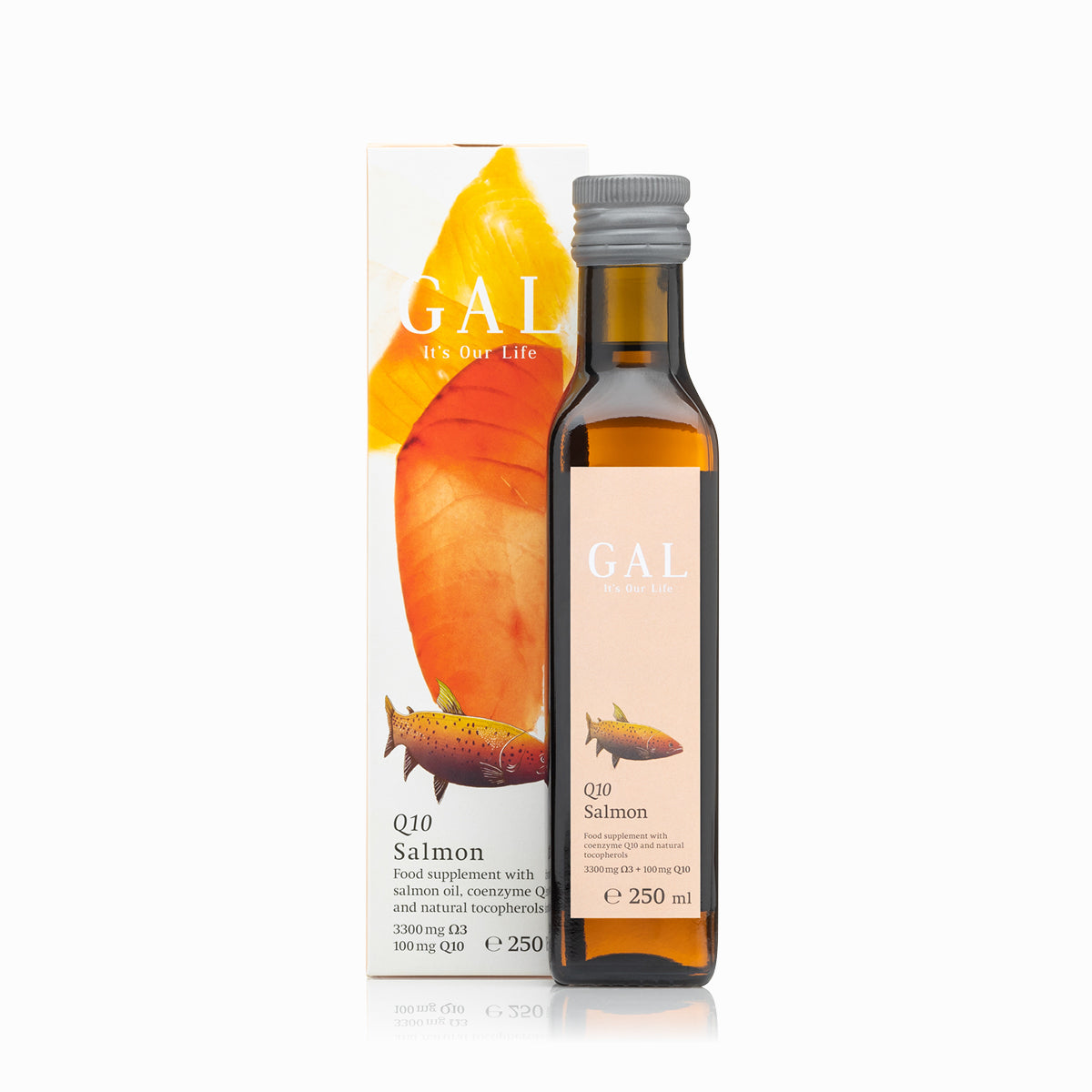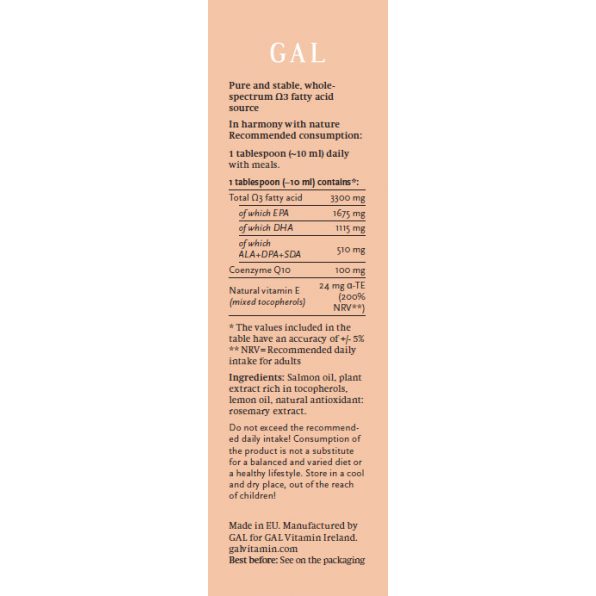Natural Balance Health Center
Salmon Oil - Q10, Omega3 and Vitamin E
Salmon Oil - Q10, Omega3 and Vitamin E
Couldn't load pickup availability
3300 mg Ω3 100 mg Q10/dose
Cardiovascular system
- It may increase blood circulation and the level of nitrogen oxide protects blood vessels and prevents cardiac infarction.
- Medications that decrease the level of cholesterol also decrease the level of Q10, thus taking Q10 supplementation may reduce their side effects.
Brain and nervous system
- Might have beneficial effects in migraine, depression and Parkinson’s disease
Miscellaneous
- It may affect fibromyalgia (muscle pain of unknown aetiology), poor sperm quality, Peyronie’s disease
Recommended consumption for adults:1 tablespoon (~10 ml) daily with meals. You can put it on a salad, on toast, or consume as per individual taste.
Omega-3 and omega-6 fatty acids are essential for the appropriate functioning of the body, as anti-inflammatory hormone-like substances are produced from the omega-3 fatty acids EPA and DHA, while the excess consumption of a certain omega-6 fatty acid (arachidonic acid) results in the production of pro-inflammatory substances. The majority of the most common diseases (lifestyle diseases) develop due to high levels of overall inflammation, which accelerates ageing as well. The human body is genetically “designed” for a ratio of around 1:1 of omega-3/6 fatty acids. The fatty acid ratio was close to 1:1 in the bodies of our ancestors, as it is still in the members of modern, very healthy ethnic groups. Unfortunately, the current low consumption of saltwater fishes, and the excess consumption of vegetable oils and fats of fed animals, both with high omega-6 fatty acid levels, this ratio has shifted significantly towards omega-6 (1:8 - 1:32). This shift is the cause of many diseases. In order to restore the appropriate ratio, the best is to decrease the consumption of food rich in omega-6 considerably, to take pure dietary supplements containing EPA and DHA regularly, and to eat saltwater fish and other seafood multiple times a week. Vegetable oils with omega-3 content are not appropriate, except for algae oils, since they contain alpha linoleic acid (ALA) instead of EPA and DHA as omega-3 fatty acids. However, this is not or only hardly transformed into useful EPA and DHA fatty acids in the human body.
Omega-3 of animal and algae origin are the most useful for the human body. The omega-3 of plant origin (ALA), apart from its restricted ability to be transformed to useful EPA and DHA forms, also decreases the production of dihomo-gamma linoleic acid in our body – a beneficial fatty acid with anti-inflammatory properties. The production of this important fatty acid is also increased by the excess consumption of omega-6 fatty acids, thus it is extremely important not to compensate our high omega-6 fatty acid intake by consuming omega-3 sources of plant origin, as both of these will cut down the level of this important anti-inflammatory fatty acid in our body. While, on the contrary, EPA and DHA do not decrease it, indeed. It is worth providing the majority of our EPA and DHA intake from dietary supplements of purified fish oil and only a small portion from consuming seawater fish and seafood, as our waters are highly contaminated today. Thus you can achieve the minimal intake of contaminating substances per unit of EPA and DHA. When developing our product, the main considerations were the following:
• To contain the most effective omega-3 fatty acids (EPA, DPA and DHA) in the natural triglyceride form instead of ethyl esters.
• To be able to introduce a large amount of these substances into the body with the least possible amount of contaminating substances.
• The product should be as economical as possible, as long as this does not compromise its efficacy and purity.
• The product should be very stable, thus preventing the oxidation of the unstable omega-3 fatty acids both within the body and during storage.
Taking into consideration all of the above, we decided to use purified fish oil, which we stabilized with a large amount of mixture of natural tocopherols (generally known as vitamin E complex) and camphor-free rosemary extract for the maximum possible stability. Softgel capsules are not economic and the proper effect can be achieved only by taking many capsules, thus we opted for the liquid version. We added natural lemon oil for a mild taste. One litre of our product contains fewer contaminants than a single can of sardines. Also, its daily dose (approx. 10 ml) contains about 1/100 of this amount, while providing about 5 times as much omega-3 fatty acids as a portion of sardines or salmon. This means that you can get 1 unit of omega-3 fatty acid together with a hundredth of contaminants compared to eating fish.
Our Q10 salmon oil contains Q10 coenzyme produced with plant fermentation, which is the most appropriate form according to recent research. As it is dissolved in an abundant amount of oil (10 ml contains 100 mg), the absorption of Q10 is also excellent. Furthermore, the naturally high d-limonene content of the lemon oil present in the product also helps the utilization of Q10. Currently, there is no natural method that would improve the absorption of Q10 any further. (Q10 products that are said to be water soluble are treated with a synthetic substance similar to detergents in order to achieve water solubility, while other Q10 products with increased absorption use allergenic soy proteins that alter the structure of the intestinal wall.) Meanwhile, dissolving Q10 in plenty of fats or oils and adding d-limonene increase the absorption of Q10 in a natural way.
It is impossible to list all the beneficial effects of consuming fish oil, that is, of a proper omega-3/6 ratio and the high level of EPA, DPA and DHA fatty acid intakes. A short summary of the most important benefits revealed by research so far: so it might be beneficial for the followings:
Brain and nervous system
• Decreases depression, aggression, irritability and bad mood
• Promotes learning processes and improves intelligence, increases brain weight, helps brain development, especially in case of appropriate intake during pregnancy and childhood
Cardiovascular system
• Helps maintain the elasticity of blood vessels, regulates cardiac rhythm and the level of cholesterol
• Decreases the risk of thrombosis, stroke and infarction, just as it maintains triglyceride and blood pressure levels.
Miscellaneous
• Helps prevent the development of macular degeneration (AMD) and dry eye syndrome, beneficial for the capillary vessels of the eye.
• Due to its strong anti-inflammatory effect, it was found to be effective against rheumatic arthritis.
• Helps maintain the health and shine of hair and skin.
• The telomere that protects the ends of the DNA-strand is shortening more slowly in people with high blood levels of EPA and DHA, which is currently the most accurate marker of life expectancy.
Our fish oil is produced from small, non-farmed wild fish. We buy the basic substance, purified fish oil from Germany, from a reliable and significant participant of the German and EU-markets; however, this does not mean that it originates from German waters. Our German partner imports fish oils from various resources, depending on which compiles the best with the strict requirements on purity and quality at a given time. This means that the actual place of origin is varying. But it is not the place of origin that matters, but the quality. What only matters for us is to select the best quality fish oil every time, considering the most favourable EPA+DPA+DHA values. This means choosing the oil with the highest purity and active substance content. Another important criterion is to have an active ingredient in triglyceride form. This is the natural and effective form - the ethyl ester form is not natural and is less effective, or even harmful. Unfortunately, most fish oil capsules are made of ethyl ester compounds, and this is often the case with bottled products as well. The purity of our fish oil is exemplary, the amount of contaminants typical of fish oils is below the detectable level, and also well below the maximum limits set by EU. (The amount of mercury and other heavy metals, for example, fails to reach one-hundredth of the limits set by the EU, while the amount of other toxic materials, such as pesticide residues and other contaminants typical in similar waters is also only a tenth or even lower than the levels considered to be safe according to EU standards.) The TOTOX value of the product is also very low, about 8.
Made in the EU
Warnings
KEEP OUT OF REACH OF CHILDREN. DO NOT EXCEED RECOMMENDED DOSE.
If you are undergoing treatment for a medical condition or if you are pregnant or lactating, please consult your medical practitioner before introducing supplementary foods to your normal routine. The dietary supplement should not be used as a substitute for a varied and balanced diet or a healthy lifestyle. Store tightly closed in a cool and dry place.
Refererence:
Exaences:mine.com / Liou et al.: Decreasing Linoleic Acid with Constant α-Linolenic Acid in Dietary Fats Increases (n-3) Eicosapentaenoic Acid in Plasma
Phospholipids in Healthy Men. J Nutr. 2007 Apr;137(4):945-52.
Liou et al.: Dietary linoleic acid has no effect on arachidonic acid, but increases n-6 eicosadienoic acid, and lowers dihomo-gamma-linolenic and
eicosapentaenoic acid in plasma of adult men. Epub 2009 Apr 8.
Wang et al. n-3 Fatty acids from fish or fish-oil supplements, but not alpha-linolenic acid, benefit cardiovascular disease outcomes in primary- and
secondary-prevention studies: a systematic review. AJCN 2006 Jul;84(1):5-17.
Schwab et al.: Effects of hempseed and flaxseed oils on the profile of serum lipids, serum total and lipoprotein lipid concentrations and haemostatic
factors. Eur J Nutr. 2006 Dec;45(8):470-7. Epub 2006 Nov 10.
Share




